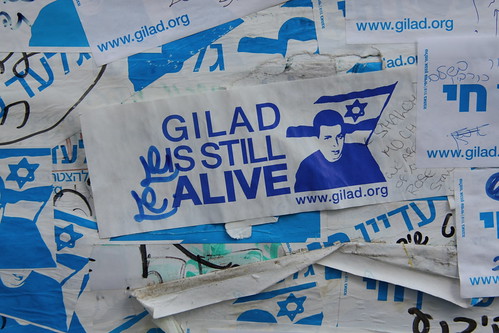During his captivity, Hamas turned down requests from the International Committee of the Red Cross (ICRC) to allow the ICRC to visit Shalit. Red Cross Director-General Yves Daccord stated that: "The Shalit family have the right under international humanitarian law to be in contact with their son". Hamas claimed that any such Red Cross humanitarian and medical visit could betray the location where Hamas was holding Shalit hostage.
Shalit's capture is often referred to as a kidnapping, because he was not granted any of the human rights due to a captured soldier under the Geneva Conventions, which entitles them to receive visits from the Red Cross and to communicate with family members, and because a ransom, even if not of a monetary nature, was demanded for his return.
In exchange for his release, Hamas demanded the release of over 1,000 prisoners � Palestinians serving prison sentences in Israel � as well as all female and underage Palestinians convicted and serving sentences. A major sticking point in negotiations was Hamas' insistence on the release of Marwan Barghouti, who is currently serving five life sentences in Israel for murder, and was referred to by Uri Avnery as "Palestine's Mandela".
Shalit was the first Israeli soldier captured by Palestinian militants since Nachshon Wachsman in 1994. Shalit, holding a rank of corporal in the IDF's Armor Corps at the time of his abduction, was promoted to Staff Sergeant, Sergeant First Class and then Sergeant Major on the eve of his release. The only contact between Shalit and the outside world after his capture and before his release were three letters, an audio tape, and a DVD that Israel received in return for releasing 20 female Palestinian prisoners.
Shalit was born on 28 August 1986 in Nahariya, Israel, to Noam and Aviva Shalit. He has an older brother, and a younger sister. He was raised from the age of two in Mitzpe Hila, in the Western Galilee.
He graduated with distinction from Manor Kabri High School. He began military service in the Israel Defense Forces in July 2005, and "despite a low medical profile, preferred to serve in a combat unit, following his older brother, Yoel, into the armored corps." He holds dual Israeli and French citizenship, via his grandmother.
Early on Sunday morning, 25 June 2006, Palestinian Hamas militants from Gaza infiltrated into Israel through an underground tunnel near the Kerem Shalom border crossing. They then infiltrated an Israeli army post on the Israeli side of the border, and attacked the Israelis. Two of the Palestinian militants were killed, while two IDF soldiers were killed and three others wounded, aside from Shalit. The militants fired a rocket-propelled grenade that hit Shalit's tank. Shalit reportedly suffered a broken left hand and a light shoulder wound, and the militants then captured him. Shalit's captors issued a statement the following day, offering information on Shalit if Israel were to agree to release all female Palestinian prisoners and all Palestinian prisoners under the age of 18. The statement was issued by the Izz ad-Din al-Qassam Brigades, the Popular Resistance Committees (which includes members of Fatah, Islamic Jihad, and Hamas), and a previously unknown group calling itself the Army of Islam. On 14 June 2007, Israel Army Radio reported that the army had received a warning on 24 June 2006, the day before Shalit was captured, about a planned capture of an Israeli soldier. According to the report, Israeli security forces entered the Gaza Strip on 24 June 2006 and detained two brothers, described as Hamas members. The report said that the brothers were transferred to Israel for interrogation, and that the information extracted formed the basis for the warning that militants would try to enter Israel through tunnels to capture soldiers stationed near Gaza. Shalit was the first Israeli soldier captured by Palestinians since Nachshon Wachsman, in 1994. His abduction and the following cross-border raid by Hezbollah, resulting in the abduction of the bodies Ehud Goldwasser and Eldad Regev into Lebanon, occurred prior to the conflicts in Gaza and Lebanon during summer 2006.
Shalit's capture is often referred to as a kidnapping, because he was not granted any of the human rights due to a captured soldier under the Geneva Conventions, which entitles them to receive visits from the Red Cross and to communicate with family members, and because a ransom, even if not of a monetary nature, was demanded for his return.
In exchange for his release, Hamas demanded the release of over 1,000 prisoners � Palestinians serving prison sentences in Israel � as well as all female and underage Palestinians convicted and serving sentences. A major sticking point in negotiations was Hamas' insistence on the release of Marwan Barghouti, who is currently serving five life sentences in Israel for murder, and was referred to by Uri Avnery as "Palestine's Mandela".
 Gilad Shalit placed a tent |  Gilad Shalit placed a tent |  in the Gilad Shalit tent |  People visit the Shalit tent - |  at the Gilad Shalit Tent |
 IDF soldier Gilad Shalit |  12/07/2011.. Yellow ribbons |  12/07/2011. Composite image of |  Jerusalem painting Shalit tent |  At the Gilad Shalit tent, |
He graduated with distinction from Manor Kabri High School. He began military service in the Israel Defense Forces in July 2005, and "despite a low medical profile, preferred to serve in a combat unit, following his older brother, Yoel, into the armored corps." He holds dual Israeli and French citizenship, via his grandmother.
 Jerusalem Shalit Gilad tent |  The family of Corporal Gilad Shalit placed a tent outside the residence of | Gilad Shalit protest tent |  of Gilad Shalit, Jerusalem |  Israeli soldier Shalit and |
Pictures from Shalit\x26#39;s tent in | Pictures from Shalit\x26#39;s tent in |  Gilad Shalit in Jerusalem, | Visitors flock to Schalit tent |  the soldier Gilad Shalit. |
No comments:
Post a Comment